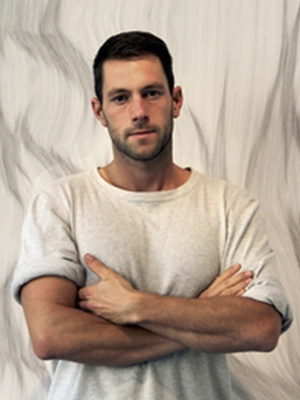- Bredestraat 4, 6211 HC Maastricht (NL)
- info@artichoque.nl
- +31 648 157 309
John Franzen werd geboren in Duitsland en groeide als enig kind op in België. Zijn jeugd stond in het teken van de voortdurende wisselingen van woonplaats, waardoor het hem ontbrak aan sociale contacten. Het gevoel van isolement dat daardoor ontstond, leidde tot een terugtrekking in zijn creatieve binnenwereld. Een intensieve opleiding aan het Robert Schumann Technisch Instituut in Eupen (met 20 uur tekenlessen per week) was de eerste stap naar zijn toekomstige professionele carrière.
Daarna volgde een tweejarig intermezzo, waarin Franzen als houthakker en creatieve natuurpedagoog voor kinderen, dicht bij de natuur werkte. In 2003 zette hij zijn kunstopleiding voort op de Kunstacademie in Maastricht, waar hij in 2008 afstudeerde.
Tegenwoordig is Franzen als zelfstandig kunstenaar werkzaam in Maastricht. Ondanks zijn universele karakter is zijn werk geworteld in de privé-ervaring. Het komt voort uit diepe zelfreflectie, bewuste afzondering en toewijding aan kunst.

John Franzen’s life experiences have constructed a world in itself, where several themes arise as essential for both his life and his art. Franzen compares himself to a scientist, a shaman, and a priest; his role and responsibility as an artist is to investigate the governing principles of the universe. In this process, he mainly focuses on the nature of darkness, nothingness, destruction, and creation. The objective of Franzen’s research is to build a cosmology, a coherent interpretation of the mechanisms of the universe.
In order to do so, Franzen experiments with different artistic methods. He begins with the use of paper and the colour white to explore what he considers the ‘beginning’. Next is the investigation of the line using ink, graphite or blood. The creation of the line is the method that formats the blueprint of the universe. The essence of this project is One Line, a single stroke, a mere movement, that aims to embody the essence of all creation. Each further act is merely a repetition of the first one. The analysis of the line and nothingness have led Franzen to transform the act of drawing into a process of meditation, a conversation between the medium and the artist. This connection transforms the visual value of his artistic project into both a performance act and a personal ritual, that serves to answer both Franzen’s inner questions, as well as his cosmological inquiries.
A further essential element of Franzen’s philosophical anthropology is the narcissistic perception of all human beings. This theme, together with the importance of destruction and deconstruction, takes his performative act to a different level with his latest project. This project consists of the use of big reflective titanium panels, which he damages using various instruments. Franzen aims to destroy in order to heal both his and the observer’s spirit. He aims to ‘destroy’ the observer’s narcissistic reflection on the metal sheet. Franzen considers that the viewers, as well as the art market, are nothing more than the center of their own space and time. Every piece Franzen creates always involves both a methodological experimentation and a ritual. The former can help him to create the cosmology while the later can heal his soul.
Artichoque Art Gallery is een galerie met hedendaagse kunst: schilderijen, sculpturen en objecten van lokale en internationale kunstenaars.
Blijf op de hoogte van onze collectie, exposities en andere activiteiten.